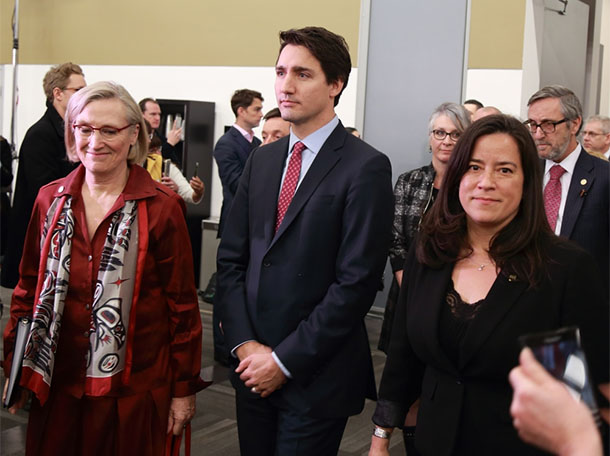The Liberal government's goodwill gesture in adopting the United Nations Declaration on Rights of Indigenous People might bring more bad blood, not reconciliation, warns a legal scholar.
Errol Mendes, a University of Ottawa law professor and editor of the National Journal on Constitutional Law, said the government needs to explain to the public how broadly or restrictively the declaration will be implemented.
"The thing I'm hoping will be avoided at all costs is raising hopes and expectations so high, which cannot be met," he said. The resulting backlash from disappointed Indigenous communities could hurt efforts at reconciliation, Mendes said.
The UN Human Rights Council adopted the declaration in 2006. Canada voted against it when it was adopted by the UN General Assembly in 2007, but in 2010 endorsed it as an "aspirational document" while maintaining permanent objector status to key elements.
Indigenous and Northern Affairs Minister Carolyn Bennett said Tuesday at UN headquarters in New York that Canada now supports the declaration and will work to implement it.
But what that means is unclear, and Mendes said the lack of clarity brings the risk of misunderstandings and conflicts.
For example, the declaration includes a requirement of consultation and prior consent for projects on First Nations' traditional lands. Many First Nations believe that gives them a veto, Mendes said.
But a landmark 2014 court decision that granted the Tsilhqot'in Nation in B.C. title to large areas of traditional land left room for projects to go ahead over the nation's objections, he said.
"Even where the First Nations own the land the court said in certain circumstances a veto would not be able to stop development if certain conditions were satisfied," Mendes said. A compelling public interest in going ahead with a project can outweigh the need for consent, he added.
Mendes pointed to other potential problems. Some First Nations might interpret the declaration's references to self-determination to mean First Nations have the right to become sovereign states, he said.
In reality, the document specifies such rights would only apply to Indigenous people's ability to manage internal affairs within the laws of Canada, Mendes said.
The risk of conflict isn't just between Indigenous peoples and governments. "There could be a clash before the provincial governments and federal governments over the ability to implement this thing," he said.
'Hypocrisy in the making'
Two First Nations in B.C. have already criticized the government's adoption of the declaration as "hypocrisy in the making."
The Prophet River and West Moberly First Nations issued a press release Tuesday saying they support Ottawa's decision, but doubt the government's sincerity.
The two First Nations have demanded Ottawa stop BC Hydro's controversial Site C dam project that will flood about 100 kilometres of the Peace River Valley. The federal government has already issued some permits for the mega-dam.
"Allowing Site C to proceed is a violation of the UNDRIP and of the Liberal party's election promise to rebuild its relationship with Canada's First Nations," the release says.
The release quoted the declaration's statement that "Indigenous peoples and individuals have the right not to be subjected to forced assimilation or destruction of their culture."
Mendes said he hopes such conflicts can be avoided through dialogue and clear understanding of the declaration's effects and its limits.
"My hope is to have a full, frank and open discussion on what each of these articles and their very deep specificity actually means so that people are fully aware of what it will take to actually implement it," he said. ![]()
Read more: Indigenous, Federal Politics















Tyee Commenting Guidelines
Comments that violate guidelines risk being deleted, and violations may result in a temporary or permanent user ban. Maintain the spirit of good conversation to stay in the discussion.
*Please note The Tyee is not a forum for spreading misinformation about COVID-19, denying its existence or minimizing its risk to public health.
Do:
Do not: